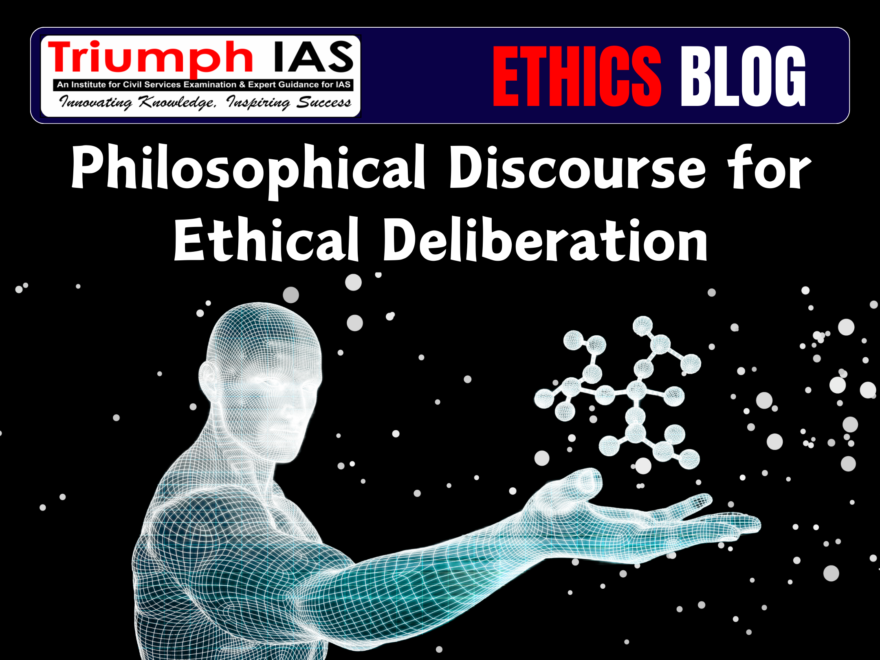Philosophical Discourse for Ethical Deliberation
[Relevant for Public Ethics, Integrity and Aptitude]

Philosophical Discourse for Ethical Deliberation
Ethics postulates, regulates and guides human life.
Moral ideals are directly applied to human behaviour.
What is more intimately connected to practical side of philosophical discourse is ethical deliberation. As human consciousness is in a process of becoming, human person is becoming moral.
Human person is in a never-ending search for oneself. The more one becomes conscious of oneself, the more he or she is oneself.
The emergence of moral precepts of human conduct has this background. What and how a human person is and should be from the fundamental moral precept.
Ethical codes cannot be deduced or inferred from mere logical ideas and abstract speculations of what should be and what ought to be etc. Human concrete existence is more than logic and ideas. Ethics as both normative and applied needs to be mutually enriching each other with contemporary functions.
Every person is and is in becoming.
Everyone is both essence and existence, act and potency, act in potency, spirit body and free yet existentially situated.
Human person is both an end in oneself and for others. Moral law is out of the tension between the “is” and the “ought-to-be”, between intuition and experience, or the a priori and the a posteriori, between the static and the dynamic, the constant and the variable, and the absolute and the relative.
In the language of moral philosophers, moral law includes not only general and abstract rules of action, e.g. do good and avoid evil, but also concrete moral precepts.
Ethics is the philosophical treatise which studies human behavior and tries to determine what is right or wrong behavior. It is also called moral philosophy.
Our study of ethics is also conditioned by some philosophical assumptions, such as the possibility of meta-empirical knowledge, the ontological structure of reality and man as a rational and free being. In short, ethics attempts to understand what is right and what is not and to see the possibility of practical conduct from these objective norms.
First, the moral law is called law only metaphorically or if it confers analogically.
The primary meaning of law is the rule of action, promulgated by him or her who is in charge of a community in view of the common good. This is called positive law. If the legislator is considered to be God, it is divine positive law. If the legislator is a human person, it is human positive law.
Human positive law can further be subdivided according to what the common good aimed, civil law, criminal law, commercial law, etc. In a case, a positive law lay down rules to be observed by human persons. It is prescription.
Then there is another sense of law which is quite different. In this sense, it is formula expressing a constant of behavior of things and of person. So, we have physical law including law studied in physics, chemistry, biology, etc., psychological law, sociological law, etc. Since the constant of behavior among human person is less fixed and foreseeable than that among things, it is more of a statistical constant.
As distinct from positive law, this kind of law is called natural law. It is descriptive. It can also be called prescriptive to the extent it is considered as built by God and includes the divine positive law and descriptive to the extent and that this divine law is the ultimate cause of the constant of behavior in things and human persons.
However, moral law corresponds exactly neither to the positive law nor to the natural law.
On the contrary, the sense of the absolute should is an immediate datum of the moral conscious itself.
Secondly, in the language of moral philosophers, moral law includes not only general and abstract rules of action or in your or in our language, the sense of the absolute should but also particular and concrete precepts, help the poor, obey legitimate authority, be truthful, do not kill the innocent, adultery is wrong.

How are the general data of the moral consciousness particularized and concretized in specific precepts and what is the cause of this difference among them?
In terms of moral value, we can raise this question as follows.
If the moral value par excellence is human person’s self-realization as human now, can this moral value determine specific moral values and why is this disagreement as to whether such and such an action is a good moral value or not?
Moral Intuitionism All deontological theories agree that there must exist some rule or law which enforces moral value and that it is natural to human person intuitively known. Then is then an element of intuition in all of them no matter how they conceive of it and the way they approach it.
Whether it is Conscience, Occam, Logos, Stoics, Moral Sense, Shaftesbury, the a priori, Categorical Imperative, Kant, Right Reason, Thomas Aquinas and Suarez. This element of moral intuition is also found in deontological theories whether implicitly or even explicitly. It is implicitly found in the concept of Autoraxia, Epicurus and that of Eudaimonia, Aristotle and explicitly in the concept of Right Reason, Hobbes in the conscientious feelings of mankind, or in Mill’s Social Utilitarianism.
And in fact, the more the idea of moral obligation is prominent in an ethical theory, the more explicit becomes the recourse to this element of intuition or direct perception.
| Ethical theory | Virtue-based | Duty-based (deontology) | Consequentialism (utilitarianism) |
| Perspective | Actor-based | Action-based | Action-based |
| Features | Emphasis placed on character and motivation | Emphasis on the manner of the action; act out of a sense of duty; moral rules are those that pass the categorical imperative test; means count; never right to treat people as just means to an end | Emphasis on the outcome or outcome of the action; no action in itself is good or bad; ends count |
| Morally correct action | Right action is that which a virtuous person would do | Right action is that following duty | Right action is that with the greatest usefulness; greatest good for the greatest number |
| Strengths | More personal; supports actions done for virtuous reasons; not bound by rules | Sets clear rules/moral boundaries; follow duty not inclination; based on reason no subjectivity; consistent | Practical; flexible; results orientated; no conflicting rules; moral form of democracy |
| Weaknesses | No universally agreed list of virtues; concerned with good character rather than the specific problem; difficulties in resolving moral conflicts or competing claims in practice; may do harm despite virtue | Questions about where rules originate; can be inflexible; not as simple as consequentialism; difficulties when rules conflict; follow duty regardless of results; ends cannot justify means even if outcome is good | Relies on single criterion when many factors need to be considered; difficulties in identifying who and what should be considered; difficulties quantifying utility; uncertainties in consequences of actions/speculative; can lack justice; does not consider individual rights; ends can justify means; bad or unjust acts permissible |
This element of intuition is strongly emphasized by meta-ethicists who maintain that moral language is objective and therefore informative. But here again they differ as to what the object of this moral intuition is. This difference is explainable by the difference in their meta-ethical theories regarding the meaning of moral good. Hence for some, this object is the rightness of specific acts. For others, it is a kind of moral property, simply, simple, and indefinable in non-moral terms.
For others, it is a general principle, the principle of utility itself, or a set of principles, of fidelity, preparation, gratitude, justice, beneficence, self-improvement, and maleficence. In ethics, the philosophy which consists on the necessity of moral intuition is called ethical intuitionism.
But even the most insistent of our moral philosophers on this element of intuition is the moral consciousness namely Kant. Not only does he not deny but on the contrary explicitly states that the moral judgment includes elements derived from experience which are therefore a posteriori as opposed to the a priori elements. Kant denies the possibility of deriving particular and concrete moral precepts from the concept of practical reason alone. For this the study of human nature is necessary.
Similarly, Thomas Aquinas distinguishes between the first principles of the synderesis which are self-evident intuitively known by all and which cannot be detected from the human heart and the secondary and more specific principles which are derived from the former. As if by way of conclusion from premises what is implied here is that the secondary principles require reflection. Thomas speaks of the difficulty involved in applying general principles to concrete cases even though principles whether theoretical or practical can be evident in themselves they may not be so evident to us and this is due according to Thomas to wrong persuasion on part of the human person.
Suarez is perhaps even more explicit in his doctrine that even the secondary principles which like the primary are self-evident in themselves require a certain amount of thought and experience. This is truer to the tertiary principles which require study and discursive thought. But all moral principles can be derived from the self-evident principle.
One notable difference between Thomas and Suarez is that the former derives the concrete principles in a way corresponding to human person’s natural inclinations. The latter derives them in a way corresponding to a legal system. For Suarez, these precepts have their immediate norm, the good of human nature. The need of experience and reflection is similarly, indeed even more insisted upon by contemporary ethicists.
Why this great insistence?
What we are dealing with here is to see whether a general principle such as serious promise should not be lightly broken is self-evident and therefore be counted among the first principle intuitively known by everybody. If yes, how is it derived from the very first self-evident principle that good is to be done and evil to be avoided? Is it merely by a kind of logical deduction. If it is self-evident in itself not but not known by all; is it because of some accidental reason such as ignorance or bad habit. Finally if it is not self-evident; how is it that human person has today come to agree that such a general principle is correct that is really of amoral value.
To speak more specifically of thinkers like Thomas, Aquinas, Suarez and Ross, are we to say that the examples they give of first principle or of prima facie duties are meant to serve merely as examples or are we to say that they are meant to be included among the first principle themselves?
In the first case, we could perhaps disagree that the examples they give are good examples but still agree with their doctrine that there exist first principles intuitively known by every man. The question would be then, which are these first principles? In the second case, to question the aptness of the examples would be to question their doctrine itself, irrespective of what such thinkers actually mean, we have got to study the problem in itself.
If there is any principle that cannot be denied, it is the immediate data of moral consciousness. If this data cannot be denied, they are self-evident. They are self-evident not as principles, that is, as formula, but as data whether they are thematically formulated or not.
The immediate ontological foundation of the moral obligation is human interrelatedness and that the norm for moral good as distinct from the moral right is human person as a social being.
We have also reflected how the only moral precept which is immediately given that is self-evident and cannot be justified on a mere moral level is that human person should be human as an individual and social being. Hence, all other precepts what we are here calling specifications of the moral law must somehow or other flow from this fundamental precept that a person should realize himself or herself as human.
Human consciousness is in the process of becoming. The more human person becomes himself or herself, the more he or she becomes conscious of what he or she should be.
This leads to the emergence of moral precepts specifying even more, clearly the conduct of human person. Hence, the moral precepts i.e. moral values flow from the first fundamental moral precept that human person should be himself or herself. The moral value par excellence not by way of mere logical deduction or of mere immediate inference.
It cannot be denied that this relation of the explicit to the implicit, of the clear to the unclear, to the unclear of the concrete, to the abstract is here present.
But, it is present in the sense that a continuously developing human consciousness is related to its stage, past and future of its development. Existence is more than logic. If that we are saying about the progressive development of human consciousness and therefore of moral consciousness is true, one can easily understand the development of morals from the caveman to modern human person, from ancient slavery to the universal declaration of human rights.
Ignorance of the moral precept is therefore not necessarily the result of perverse customs as if this result were accidental.
It is a fact of experience that perverse customs not only weaken the will to pursue the moral good but darkens the mind to recognize what the moral good is. But that is more easily possible on an individual level. Here, we are placing ourselves on the level of mankind and its historical progress.
However, we must not easily take it for granted that this development has always and everywhere been a linear progress. It may have suffered setbacks, reverses and regress. Apart from the fact that one cannot predict the future, contemporary moral problems of the morality of abortion hinges to a great extent on whether one should consider the human foetus a human person. The so-called women’s liberation movement indicates, no matter what its merits and demerits are, that women have not been treated as full human persons everywhere in the world. One could think of many other indications.
#EthicsBlogoTerms
Related Blogs …
 |
 |
Follow us :



Find More Blogs…
| Compare and contrast Karl Marx’s and Max weber’s | Karl Marx- Historical Materialism |
| Position of Women In the Modern Indian Society | Sociology: Social system and pattern variables |


